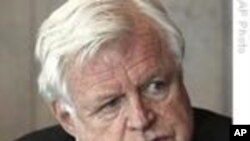<!-- IMAGE -->On the evening of Tuesday, August 25th, U.S. Senator Ted Kennedy died of brain cancer at his home in Hyannis Port, Massachusetts. He was 77 years old. With his death, the less fortunate people of this world lost an advocate, for, in the words of his friend Senator Robert Byrd, Ted Kennedy "believed in a simple premise: that our society's greatness lies in its ability and willingness to provide for its less fortunate members."
Born Edward Moore Kennedy, he followed his older brothers John and Robert into politics when, at the age of 30, he filled his brother's senate seat, vacated upon John's election to the Presidency. Over the subsequent 47 years, he became known as "The Lion of the Senate" through his long tenure and influence. Over 300 of his bills were enacted into law, including laws addressing immigration, cancer research, health insurance, apartheid, disability discrimination, AIDS care, civil rights, mental health benefits, children's health insurance, education and volunteering. It is fair to say that his work affects the lives of virtually every man, woman and child in the U.S.
What is less known is his work on the international level. Ted Kennedy was instrumental in making the promotion of human rights a significant factor in U.S. foreign policy. As well, he played a powerful part in building a global coalition to confront child poverty in every country. But perhaps his greatest triumphs came in Ireland, Bangladesh and South Africa.
In 1971, Senator Kennedy visited then-East Pakistan, which was in the midst of a bloody war for independence, and wrote a report that significantly helped the cause of what is today Bangladesh. A few years later, according to the Nelson Mandela Foundation, Senator Kennedy "made his voice heard in the struggle against apartheid at a time when the freedom struggle was not widely supported in the West." And finally, in the late 1990s, Ted Kennedy helped broker a power-sharing government between the Reverend Ian Paisley and Martin McGuiness, ending decades of conflict in Ireland.
"An important chapter in our history has come to an end," said President Obama in a written statement. “Our country has lost a great leader, who picked up the torch of his fallen brothers and became the greatest United States senator of our time.
"For 5 decades, virtually every major piece of legislation to advance the civil rights, health and economic well being of the American people bore his name and resulted from his efforts."
Born Edward Moore Kennedy, he followed his older brothers John and Robert into politics when, at the age of 30, he filled his brother's senate seat, vacated upon John's election to the Presidency. Over the subsequent 47 years, he became known as "The Lion of the Senate" through his long tenure and influence. Over 300 of his bills were enacted into law, including laws addressing immigration, cancer research, health insurance, apartheid, disability discrimination, AIDS care, civil rights, mental health benefits, children's health insurance, education and volunteering. It is fair to say that his work affects the lives of virtually every man, woman and child in the U.S.
What is less known is his work on the international level. Ted Kennedy was instrumental in making the promotion of human rights a significant factor in U.S. foreign policy. As well, he played a powerful part in building a global coalition to confront child poverty in every country. But perhaps his greatest triumphs came in Ireland, Bangladesh and South Africa.
In 1971, Senator Kennedy visited then-East Pakistan, which was in the midst of a bloody war for independence, and wrote a report that significantly helped the cause of what is today Bangladesh. A few years later, according to the Nelson Mandela Foundation, Senator Kennedy "made his voice heard in the struggle against apartheid at a time when the freedom struggle was not widely supported in the West." And finally, in the late 1990s, Ted Kennedy helped broker a power-sharing government between the Reverend Ian Paisley and Martin McGuiness, ending decades of conflict in Ireland.
"An important chapter in our history has come to an end," said President Obama in a written statement. “Our country has lost a great leader, who picked up the torch of his fallen brothers and became the greatest United States senator of our time.
"For 5 decades, virtually every major piece of legislation to advance the civil rights, health and economic well being of the American people bore his name and resulted from his efforts."




